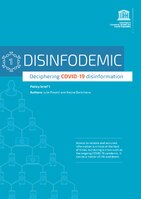
Photo from wikipedia
Truth and falsehood are central subjects in philosophical, political science and mass communication scholarship as an informed citizenry is regarded as a necessity for a wellfunctioning democracy. Concomitantly, the reporting… Click to show full abstract
Truth and falsehood are central subjects in philosophical, political science and mass communication scholarship as an informed citizenry is regarded as a necessity for a wellfunctioning democracy. Concomitantly, the reporting of the verifiable truth is the fundamental mission for professional journalism. Scholars and journalists alike have long been worried about citizens’ ability to learn about truth (Lippmann, 1925). However, in the past decade, the concern about the spread of false information has become more publicly acute than the concern about the lack of information, and the concern about misperception is no less pressing than the concern about ignorance. The increasing prevalence of misinformation, accompanied by digitalized, networked, and polarized media environment, is fundamentally reshaping the political information landscape. Conceptually, “misinformation” refers to the type of information that is “factually false,” i.e. not consistent with the best available evidence (Kuklinski, Quirk, Jerit, Schwieder, & Rich, 2000). This emphasis on facticity differentiates “misinformation” from “disinformation,” which focuses on deceptive intent of the source and does not require the information to be either “factual” or “false.” Additionally, most researchers favor “misinformation” over “fake news” in describing false information, a term that has been loosely used in reference to misinformation, disinformation, satire, parody, native advertising, as well as unfavorable coverage of the ingroup (Tandoc, Lim, & Ling, 2018). “Misinformation” also has a narrower conceptual boundary than “junk news,” a concept proposed by Bradshaw, Howard, Kollanyi, and Neudert (2019) that aims at classifying sources “that deliberately publish misleading, deceptive, or incorrect information packaged as real news” not only based on counterfeit, but also professionalism, style, credibility, and bias. In this essay, I review the state of the field of misinformation research from three orienting questions: what is the scope of political misinformation? What are the cognitive, attitudinal, and behavioral consequences of misinformation? When and how does corrective information work? I offer directions in developing a research agenda that advances the theorization of misinformation and its correction in complex political, social, and communication ecologies.
Journal Title: Political Communication
Year Published: 2020
Link to full text (if available)
Share on Social Media: Sign Up to like & get
recommendations!